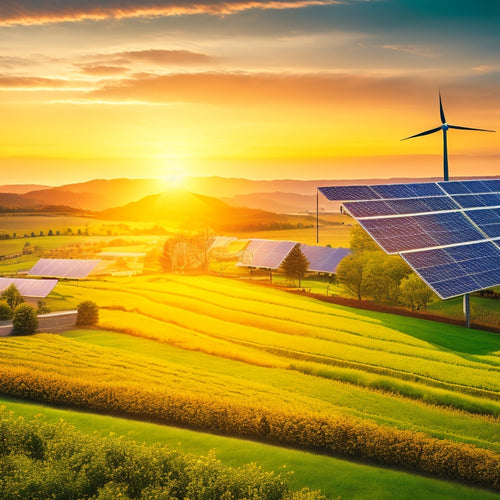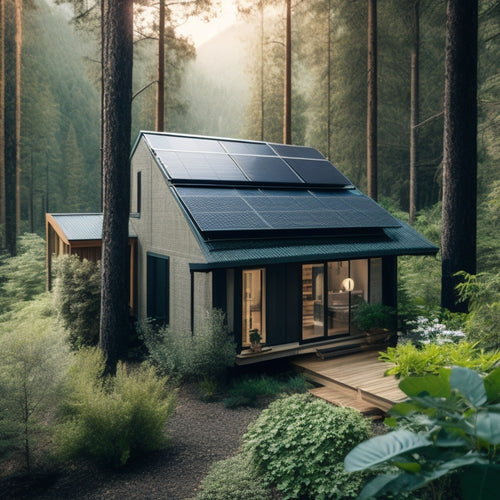
Why Off-Grid Homes Need Custom Energy Design
Share
When you're building an off-grid home, a custom energy design is essential to guarantee efficient energy production and cost savings. You'll need to accurately assess your energy demands, considering factors like peak usage patterns and appliance wattage. A site-specific solar resource analysis will help you optimize panel orientation and system sizing. Load calculation and energy storage system design are also vital to guaranteeing reliable power supply. By understanding these complex components, you can create a bespoke energy system that meets your unique needs. Now, uncover how to reveal the full potential of your off-grid home's energy system.
Overview
- Off-grid homes require custom energy design to optimize energy efficiency and minimize reliance on renewable sources.
- A tailored approach ensures that the energy system is sized correctly to meet the specific needs of the home and its occupants.
- Custom energy design considers site-specific factors, such as solar resource analysis and optimal panel orientation, to maximize energy production.
- Energy storage system design and inverter/charge controller selection must be customized to ensure reliable power supply and efficient energy conversion.
- A custom energy design integrates all components seamlessly, ensuring optimal performance, reducing energy waste, and providing a reliable off-grid energy solution.
Assessing Energy Demands Accurately
To accurately size an off-grid energy system, you must first determine your energy demands. This involves conducting an energy audit to identify areas for energy efficiency improvements and understanding your peak usage patterns.
Load calculations require listing appliances, wattage, and daily usage hours, including peak hours and standby power consumption energy needs assessment. By reducing your energy consumption through sustainable practices and energy conservation, you'll require fewer renewable sources to power your home.
Additionally, focusing on energy efficiency will maximize renewable energy investment benefits, including upgrading to energy-efficient appliances and installing occupancy sensors. Demand response strategies can also help manage energy usage during periods of high demand.
A thorough energy auditing process will help you identify opportunities to optimize your energy usage, ensuring your off-grid energy system is properly sized for grid independence. By prioritizing energy efficiency, you'll enjoy a more reliable and sustainable off-grid lifestyle.
Site-Specific Solar Resource Analysis
You'll need to assess the regional irradiance to determine the amount of solar energy available at your off-grid home's location.
When selecting solar panels, it's crucial to evaluate high-efficiency options from brands like SunPower and Panasonic to enhance performance.
Next, you'll conduct a shading and obstruction analysis to identify any potential barriers to sunlight, such as trees or buildings, that could impact your solar panel system's performance.
Assessing Regional Irradiance
About 70% of the Earth's surface receives a substantial amount of solar radiation, making solar energy a viable option for off-grid homes.
When evaluating regional irradiance, you need to take into account the average daily solar radiation your location receives. This determines the solar performance of your off-grid home's energy system.
You'll want to analyze irradiance variability throughout the year, as it affects energy production. In fact, Energy Efficient Smart Thermostats can also play an essential role in optimizing energy usage based on schedules and habits.
Regional irradiance patterns influence the system's design, including the required panel size, orientation, and tilt.
Accurate evaluations of regional irradiance guarantee your energy system is optimized for maximum energy production, reducing reliance on backup power sources and securing your freedom from grid dependence.
Shading and Obstruction Analysis
Beyond regional irradiance, your off-grid home's energy system design must account for site-specific factors that impact solar energy production. To maximize energy efficiency, you need to assess the unique conditions of your building site.
| Site-Specific Factors | Impact on Solar Energy Production |
| Terrain considerations | Microclimate effects, shading solutions |
| Vegetation impact | Seasonal variations, solar access |
| Structural design, building materials | Energy efficiency, environmental factors |
A thorough shading and obstruction analysis considers these factors to optimize your solar energy system. By understanding how your site's unique features interact with the solar resource, you can design a system that minimizes energy losses and maximizes energy gains. This customized approach guarantees your off-grid home's energy system is customized to your specific environment, providing the freedom and independence you desire.
Optimal Panel Orientation
As you've assessed the site-specific factors affecting your off-grid home's energy system, it's now crucial to hone in on the best panel orientation to maximize energy production.
A site-specific solar resource analysis will identify the ideal panel orientation, considering the latitude, altitude, and local solar radiation patterns. This guarantees your solar panel efficiency is maximized, generating the most energy possible.
The best tilt of your solar panels is critical, as it directly impacts energy output. A precise calculation of the best tilt angle will guarantee your system operates at peak performance.
Load Calculation and Sizing
You're now ready to tackle the critical task of load calculation and sizing, where accuracy is paramount to guarantee your off-grid energy system meets your specific needs.
To achieve this, you'll need to grasp system sizing essentials, including determining your total daily energy requirements and identifying the most energy-intensive appliances.
System Sizing Essentials
Accurate system sizing is vital to guaranteeing your off-grid home's energy independence. When it comes to grid independence strategies, getting the system size right is essential. A properly sized system guarantees that your renewable energy integration meets your energy needs efficiently.
| System Component | Sizing Considerations |
|---|---|
| Solar Array | Peak sun hours, panel efficiency, and inverter capacity |
| Battery Bank | Depth of discharge, autonomy days, and charging/discharging rates |
| Inverter/Charger | Power output, surge capacity, and charging efficiency |
| Charge Controller | Maximum power point tracking, voltage regulation, and overcharge protection |
| Generator (optional) | Power output, fuel efficiency, and noise level |
Accurate Load Analysis
To guarantee your off-grid home's energy independence, calculating your energy load requirements is essential.
You'll need to determine the total energy consumption of your appliances, lighting, and HVAC systems to verify your renewable energy system can meet your needs.
Accurate load analysis involves evaluating your energy usage patterns, considering factors like energy efficiency, renewable integration, and environmental impact.
A thorough cost-benefit analysis will help you optimize your system's performance and reduce costs.
By reflecting on regulatory considerations and technology advancements, you can design a system that's customized to your needs and maximizes grid independence.
With sustainability practices and design flexibility in mind, you can create a reliable and efficient energy system that utilizes community resources and supports your off-grid lifestyle.
Energy Storage System Design
How do you guarantee a steady supply of power when the sun isn't shining or the wind isn't blowing? A well-designed energy storage system (ESS) is essential for off-grid homes. You need to take into account factors like battery chemistry, energy efficiency, and renewable integration to secure a reliable backup solution.
| ESS Considerations | Benefits | Challenges |
|---|---|---|
| Cost Considerations | Scalability options, grid independence | High upfront costs |
| Battery Chemistry | Energy efficiency, system lifespan | Environmental impact, technology limitations |
| Renewable Integration | Increased energy independence, reduced reliance on fossil fuels | Complexity in system design, potential for energy waste |
Inverter and Charge Controller Selection
As you design your off-grid home's energy system, selecting the right inverter and charge controller is imperative for efficient energy conversion and storage.
You'll need to choose from various inverter types, such as string, micro, or power optimizer inverters, considering factors like system compatibility and battery integration. Charge controller efficiency is also essential, as it directly affects energy conversion and storage.
Make sure the charge controller is compatible with your battery bank and can handle the maximum power output of your solar array. Proper installation is crucial, so follow best practices for inverter placement, considering factors like temperature, ventilation, and accessibility.
System Monitoring and Maintenance
Your off-grid energy system's performance relies heavily on accurate system monitoring and maintenance. You need to keep a close eye on your system's performance to guarantee it's running efficiently and effectively.
Remote monitoring allows you to track your system's performance in real-time, identifying potential issues before they become major problems.
Establishing maintenance schedules and performing routine checks can help prevent faults and prolong the lifespan of your system. Troubleshooting techniques and performance evaluation will help you identify areas for improvement.
Data analytics can inform system upgrades, and predictive maintenance can help you stay ahead of potential issues. Additionally, user training will enable you to take control of your system's maintenance, assuring you're always in charge of your off-grid energy needs.
Frequently Asked Questions
Can I Use My Existing Well Pump With an Off-Grid Energy System?
You'll need to assess your well pump's compatibility with your off-grid energy system, considering factors like voltage, current, and power requirements, to guarantee seamless integration and efficient energy use, avoiding potential system failures or inefficiencies.
Do I Need a Backup Generator for My Off-Grid Home?
You'll need to determine if a backup generator is necessary for your off-grid home by evaluating your energy usage and considering generator sizing, fuel options, and your desired level of energy independence and security.
How Do I Ensure My System Is Compatible With Future Upgrades?
You'll guarantee your system is compatible with future upgrades by prioritizing future-proofing systems, considering energy storage options that can adapt to advancing technologies, and designing a scalable infrastructure that can seamlessly integrate new components as needed.
Are Off-Grid Energy Systems More Prone to Electrical Surges?
You'll be shocked to know that 60% of electrical failures are caused by power surges! As you venture off-grid, you're right to wonder if your system is more prone to electrical surges; incorporating surge protection and energy storage solutions can safeguard your investment and guarantee a reliable supply.
Can I Install an Off-Grid System Myself to Save Money?
You can attempt a DIY installation to save money, but be aware that incorrect configurations can lead to system inefficiencies, safety hazards, and even void warranties, ultimately offsetting any initial cost considerations.
Ready to Buy
As you commence your off-grid adventure, remember that a custom energy design is not a luxury, but a crucial lifeline. It's the thread that weaves together your energy independence, ensuring that your lights stay bright, your water stays warm, and your communication stays connected. By investing in a customized approach, you're not just generating power – you're crafting a resilient, self-sufficient lifestyle that's uniquely yours.
Related Posts
-

Net Metering in Renewable Energy's Future
Net metering's future is vital for driving renewable energy growth and financial savings. You can reduce your electri...
-

Smart Home Thermostats to Revolutionize Your Space
Smart home thermostats revolutionize your space by providing precise temperature control and optimizing energy saving...
-

Off Grid Solar Batteries
As you shift to off-grid living, you'll rely on high-performance solar batteries to store excess energy generated by ...


